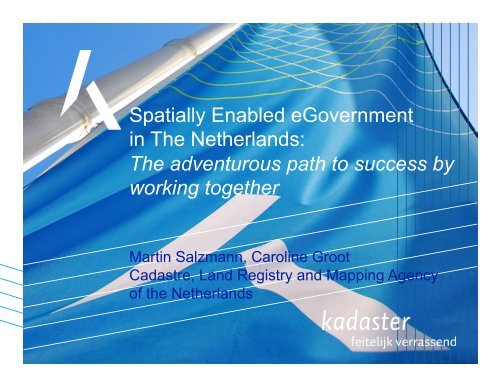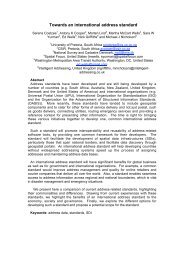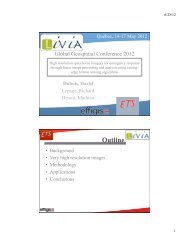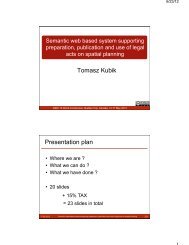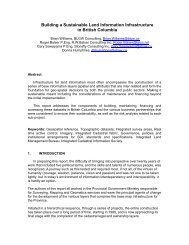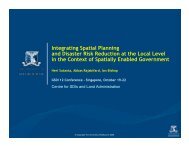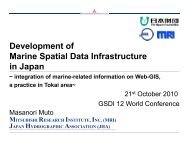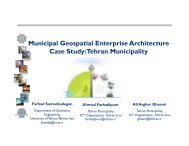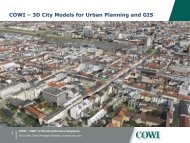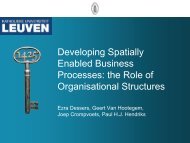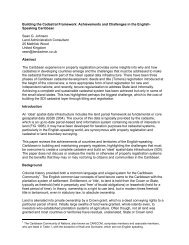Spatially Enabled eGovernment in The Netherlands - Global Spatial ...
Spatially Enabled eGovernment in The Netherlands - Global Spatial ...
Spatially Enabled eGovernment in The Netherlands - Global Spatial ...
Create successful ePaper yourself
Turn your PDF publications into a flip-book with our unique Google optimized e-Paper software.
<strong><strong>Spatial</strong>ly</strong> <strong>Enabled</strong> <strong>eGovernment</strong><br />
<strong>in</strong> <strong>The</strong> <strong>Netherlands</strong>:<br />
<strong>The</strong> adventurous path to success by<br />
work<strong>in</strong>g together<br />
Mart<strong>in</strong> Salzmann, Carol<strong>in</strong>e Groot<br />
Cadastre, Land Registry and Mapp<strong>in</strong>g Agency<br />
of the <strong>Netherlands</strong>
Outl<strong>in</strong>e of presentation<br />
• Central issue: cooperation<br />
• Context of SDI <strong>in</strong> the <strong>Netherlands</strong><br />
• Lessons learned <strong>in</strong> <strong>in</strong>formation cha<strong>in</strong>s<br />
• Experiences <strong>in</strong> network cooperation
eGovernement <strong>in</strong> the <strong>Netherlands</strong><br />
• Improv<strong>in</strong>g services for citizens and bus<strong>in</strong>esses<br />
• Increas<strong>in</strong>g governement efficiency and effectiveness<br />
• Decreas<strong>in</strong>g adm<strong>in</strong>istrative burden and fraud<br />
National Program program <strong>in</strong> place:<br />
- basic <strong>in</strong>frastructure<br />
(key registers, access/authentication,<br />
data exchange, <strong>in</strong>formation nodes)<br />
- services
Vision <strong>Netherlands</strong>’ SDI<br />
– Government is able to use all location based<br />
<strong>in</strong>formation for her <strong>in</strong>ternal processes and external<br />
services.<br />
– Citizens and companies are able to view and use<br />
location specific <strong>in</strong>formation from the government.<br />
– Companies are able to create value added services<br />
from governmental geo-<strong>in</strong>formation<br />
– Government, companies and research<br />
organizations are cooperat<strong>in</strong>g <strong>in</strong> order to develop<br />
and <strong>in</strong>novate the Dutch SDI.
GI-council strategic<br />
Geonovum tactical<br />
RGI/Geoland R&D<br />
eGov programs<br />
operational
Maturity of SDI Components<br />
data<br />
standards<br />
technology<br />
policy<br />
people<br />
(Bregt, 2007)
Work<strong>in</strong>g <strong>in</strong> (spatial <strong>in</strong>formation) cha<strong>in</strong>s:<br />
Assess<strong>in</strong>g quality of collaboration <strong>in</strong> Dutch SDI<br />
Start<strong>in</strong>g po<strong>in</strong>t:<br />
- why do <strong>in</strong>itiatives not always work as we wish?<br />
Methodology:<br />
- consider NSDI as an organisation<br />
- use commonly used bus<strong>in</strong>ess/management models<br />
- use of EFQM-model applied to cooperation <strong>in</strong> cha<strong>in</strong><br />
(EFQM Excellence model: www.efqm.org)<br />
(Laarakker, Eert<strong>in</strong>k, De Bree, 2008)
EFQM / INK model<br />
People<br />
Management<br />
People<br />
Satisfaction<br />
Leadership<br />
Policy & Strategy<br />
Processes<br />
Customer<br />
Satisfaction<br />
Results<br />
Resources<br />
Impact on<br />
Society<br />
ENABLERS<br />
RESULTS<br />
Improvements and <strong>in</strong>novations
Work<strong>in</strong>g <strong>in</strong> (spatial <strong>in</strong>formation) cha<strong>in</strong>s: lessons learned<br />
• Leadership<br />
– Fear of loss of identity<br />
• Strategy<br />
– What is the cha<strong>in</strong> problem?<br />
– Political pressure helps!<br />
• People management<br />
– When you cooperate, do not forget to tell your staff<br />
• Processes<br />
– Level of cooperation (operational, tactical, strategic)<br />
– Typology (cha<strong>in</strong>s, networks)<br />
• Resources<br />
– ICT<br />
– F<strong>in</strong>ance<br />
Cooperation you have to learn!
Relations <strong>in</strong> e-Governement/NSDI<br />
(geoloketten, 2008)
From cha<strong>in</strong> to network: <strong>in</strong>itiative<br />
'public services with digital maps'<br />
Create a national shared geo-<strong>in</strong>formation service<br />
• Legal and policy framework (INSPIRE, Public<br />
Sector Information, <strong>eGovernment</strong>, SDI-policy)<br />
• Integrated and coupled data and services<br />
• Government reform (efficiency)<br />
• Initiative taken by the public geo-sector:<br />
achiev<strong>in</strong>g results by work<strong>in</strong>g together<br />
Result: a spatially enabled government
Partners PDOK (public services with digital maps)<br />
Cadastre<br />
Roads and Waterways<br />
Subterranean<br />
Agriculture<br />
Plann<strong>in</strong>g and environment
Partners<br />
• Department of Hous<strong>in</strong>g, Plann<strong>in</strong>g and the Environment<br />
• Public Agencies<br />
Geological Survey (TNO)<br />
<strong>The</strong> Government Service for Land and Water Management (DLG)<br />
Directorate-General for Public Works and Water Management<br />
(Rijkswaterstaat)<br />
Cadastre, Land Registry and Mapp<strong>in</strong>g Agency (Kadaster)<br />
• Department of the Interior: launch<strong>in</strong>g customer
Bus<strong>in</strong>ess Case and Public Case<br />
Bus<strong>in</strong>ess case<br />
Public case<br />
• efficieny (re-use of<br />
components,<br />
shar<strong>in</strong>g of facilities,<br />
shar<strong>in</strong>g of data)<br />
• society and other<br />
governments benefit<br />
• cooperation with<strong>in</strong><br />
central government<br />
leads to a susta<strong>in</strong>able<br />
SDI<br />
smaller and better<br />
(shar<strong>in</strong>g resources, knowledge, improved access,<br />
improved services, compliance)
Issues<br />
• Who participates (supply and demand side)?<br />
• Conditions of shar<strong>in</strong>g data<br />
(harmonisation; access regimes; bus<strong>in</strong>ess model)<br />
• Sound bus<strong>in</strong>ess case at all levels<br />
• Sett<strong>in</strong>g up of services (empower<strong>in</strong>g demand;<br />
consider<strong>in</strong>g effect on exist<strong>in</strong>g arrangements<br />
and bus<strong>in</strong>ess models partners)<br />
• Stay <strong>in</strong> sync with INSPIRE and <strong>eGovernment</strong>
Mak<strong>in</strong>g cooperation successful<br />
Start<strong>in</strong>g po<strong>in</strong>t of<br />
an adventurous journey<br />
networks work:<br />
- based on trust<br />
- shared objectives<br />
networks can be weak
Essential elements cooperation along the way<br />
vision<br />
+<br />
necessity<br />
Essential<br />
- overall<br />
- at all partners<br />
- always<br />
+<br />
(shared) <strong>in</strong>centives<br />
+<br />
resources<br />
+<br />
plan
What happens if an element is absent?<br />
vision<br />
partners choose their own path<br />
+<br />
necessity<br />
one of many projects<br />
+<br />
+<br />
(shared)<br />
<strong>in</strong>centives<br />
resources<br />
focus/priority on own organisation<br />
discussion group<br />
+<br />
plan<br />
non orchestrated activities
Lessons learned so far (I)<br />
vision<br />
formulate shared objectives:<br />
be realistic <strong>in</strong> the short term; manage expectations<br />
necessity<br />
loss of focus on shared objectives;<br />
requires leadership<br />
(shared) <strong>in</strong>centives<br />
permanent competition<br />
at partner organisations<br />
allocate resources<br />
resources<br />
keep it simple; operate <strong>in</strong> steps<br />
professional projectmanagement essential<br />
plan
Lessons learned so far (II)<br />
• Take care essential elements are all<br />
simultaneously <strong>in</strong> place<br />
• Reassess status periodically<br />
• Make sure that all partners are fully committed<br />
• Accept that <strong>in</strong>dividual <strong>in</strong>terests exist<br />
• Start small, develop step by step, grow later<br />
• Not all partners are equal (accept different roles)<br />
• Take the lead as partners (let not expectations<br />
lead you)<br />
• Let trust develop (the proof of the pudd<strong>in</strong>g is <strong>in</strong><br />
the eat<strong>in</strong>g).
Cooperation you have to learn<br />
Start learn<strong>in</strong>g by do<strong>in</strong>g<br />
Make it happen; do not let it happen


